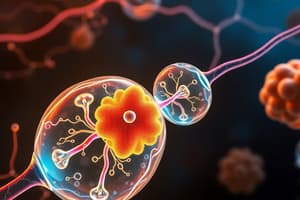Podcast
Questions and Answers
What is the primary source of energy for most living things on Earth?
What is the primary source of energy for most living things on Earth?
- Photosynthesis (correct)
- Decomposers
- Cellular respiration
- Metabolism
What is the role of chlorophyll in photosynthesis?
What is the role of chlorophyll in photosynthesis?
- To convert carbon dioxide and water into glucose
- To synthesize proteins
- To release oxygen into the atmosphere
- To absorb sunlight energy (correct)
What is the byproduct of photosynthesis that is released into the atmosphere?
What is the byproduct of photosynthesis that is released into the atmosphere?
- Oxygen (correct)
- Water
- Carbon dioxide
- Glucose
What is the process that occurs in the chloroplasts of plant cells?
What is the process that occurs in the chloroplasts of plant cells?
What is the source of energy for plants?
What is the source of energy for plants?
What is the term for the community of living organisms interacting with each other and their physical environment?
What is the term for the community of living organisms interacting with each other and their physical environment?
What is the primary function of metabolism in an organism?
What is the primary function of metabolism in an organism?
What is the byproduct of cellular respiration that is released into the atmosphere?
What is the byproduct of cellular respiration that is released into the atmosphere?
What is the process by which cells break down glucose to release energy in the form of ATP?
What is the process by which cells break down glucose to release energy in the form of ATP?
What is the primary source of energy for most life on Earth?
What is the primary source of energy for most life on Earth?
What is the process by which cells release energy from food molecules without oxygen?
What is the process by which cells release energy from food molecules without oxygen?
What is the purpose of understanding cellular respiration and metabolism?
What is the purpose of understanding cellular respiration and metabolism?
Study Notes
Biology: Photosynthesis, Ecosystems, Metabolism, and Cellular Respiration
Biology is the scientific study of living organisms and their interactions with the environment. It is a vast field, covering many topics and subtopics. In this article, we will focus on four key aspects of biology: photosynthesis, ecosystems, metabolism, and cellular respiration.
Photosynthesis
Photosynthesis is a critical process that occurs in plants and some types of bacteria. It is the means by which plants convert sunlight, carbon dioxide, and water into oxygen and glucose. This process is essential for the survival of plants and many other organisms. Photosynthesis takes place in the chloroplasts of plant cells, which contain the green pigment chlorophyll that absorbs sunlight. The energy from sunlight is used to convert carbon dioxide and water into glucose, which serves as a source of energy for the plant, and oxygen, which is released into the atmosphere.
Ecosystems
An ecosystem is a community of living organisms interacting with each other and their physical environment. Photosynthesis plays a crucial role in ecosystems, as it provides the primary source of energy for most living things on Earth. Plants, which perform photosynthesis, are at the base of most food chains, providing energy to herbivores, which in turn provide energy to carnivores and decomposers. The energy from these processes flows through the ecosystem, from one organism to another, supporting life at all levels.
Metabolism
Metabolism is the set of chemical reactions that occur within an organism to maintain life. It includes both anabolic reactions, which build up complex molecules, and catabolic reactions, which break down complex molecules to release energy. A key pathway in energy metabolism is cellular respiration, which occurs in the mitochondria of cells and is the process by which cells break down glucose to release energy in the form of ATP.
Cellular Respiration
Cellular respiration is the process by which cells release energy stored in ATP to perform various functions. It involves breaking down food molecules, such as glucose, in the presence of oxygen, producing ATP and releasing carbon dioxide and water as waste products. When oxygen is not available, cells can perform a process called fermentation, which produces ATP by breaking down glucose without oxygen.
In summary, biology encompasses a wide range of topics, including photosynthesis, ecosystems, metabolism, and cellular respiration. These processes are interconnected, with photosynthesis providing the primary source of energy for most life on Earth, and cellular respiration releasing energy from food molecules to support cellular functions. Understanding these processes is crucial for understanding the fundamental principles of life.
Studying That Suits You
Use AI to generate personalized quizzes and flashcards to suit your learning preferences.
Description
Test your knowledge of the fundamental biological processes, including photosynthesis, ecosystems, metabolism, and cellular respiration. Learn how these interconnected processes support life on Earth.




